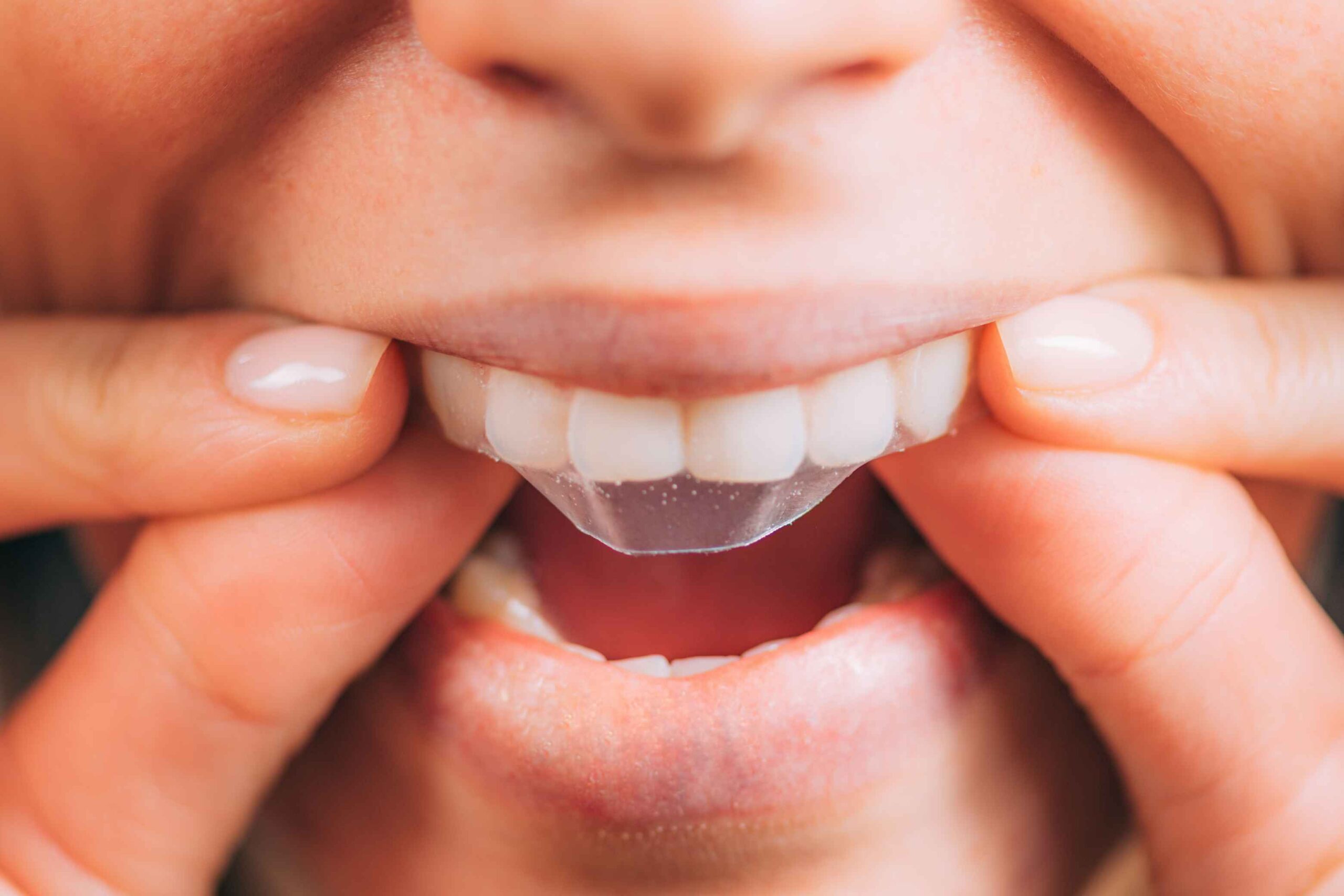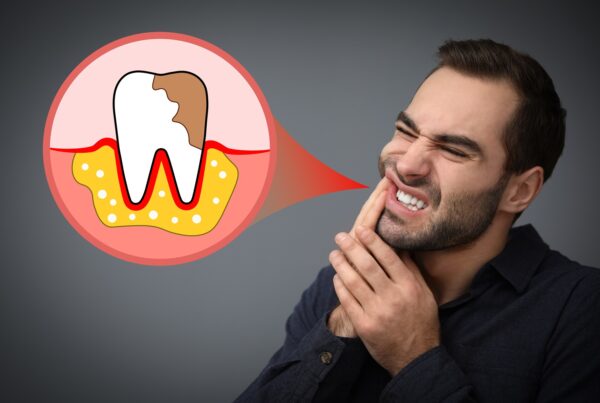A bright, white smile is a confidence booster. But with daily coffee, tea, red wine, and even certain medications, teeth can become stained and dull over time.
Teeth whitening strips have become a popular at-home option for achieving a whiter smile. But are they truly effective, and are they safe for your teeth?
American Dental Practices, with locations in Oberoi Mall, Malad, Mumbai, and Indiranagar, Bangalore, is here to shed light on teeth whitening strips and offer a more permanent alternative.
What are Teeth Whitening Strips?
Teeth whitening strips are thin, flexible pieces of plastic coated with a bleaching agent, typically hydrogen peroxide or carbamide peroxide. These agents work by breaking down stain molecules on the surface of your teeth, resulting in a whiter appearance.
You apply the strips directly to your teeth for a designated period, usually 30 minutes to an hour, according to the product instructions. The bleaching agent then penetrates the enamel, the outer layer of your tooth, to lighten stains.
There are various types of teeth whitening strips available over-the-counter, differing in:
- Strength of the bleaching agent: The concentration of peroxide will impact the whitening power of the strips. Higher concentrations may whiten teeth faster but also increase the risk of sensitivity.
- Application time: The recommended wear time for whitening strips can vary from 30 minutes to an hour or more.
- Treatment duration: Some whitening strips are designed for one-time use, while others require a multi-week treatment plan.
- Flavoring and additional ingredients: Certain strips may include flavorings or additional ingredients like desensitizers to reduce discomfort.
What are Teeth Whitening Strips Made Of?
The two main components of teeth whitening strips are:
- Bleaching Agent: As mentioned earlier, the primary whitening agent in most strips is either hydrogen peroxide or carbamide peroxide. Hydrogen peroxide breaks down into water and oxygen, with the oxygen acting to bleach stains. Carbamide peroxide, on the other hand, breaks down into hydrogen peroxide and urea, with the hydrogen peroxide being the whitening agent. Generally, carbamide peroxide is considered a gentler option that releases hydrogen peroxide more slowly.
- Adhesive: This component holds the strip securely to your teeth during the whitening process. The adhesive should be gentle enough to remove easily without damaging your teeth or gums.
In addition to these main ingredients, some whitening strips may contain:
- Desensitizers: These ingredients, like potassium nitrate, can help reduce tooth sensitivity that may occur during whitening.
- Hydrating agents: These help prevent the strips from drying out and ensure optimal contact with your teeth.
- Flavorings: These can mask any unpleasant taste associated with the bleaching agent.
How Much Do Teeth Whitening Strips Cost?
The cost of teeth whitening strips can vary depending on the brand, strength of the bleaching agent, and the number of treatments included in a package. Generally, a box of teeth whitening strips can range from ₹500 to ₹2000.
While a seemingly affordable option compared to professional whitening, it’s important to factor in the potential limitations of strips, such as uneven whitening or the need for frequent touch-ups, which could ultimately lead to higher costs over time.
Are whitening strips good for your teeth?
The short answer is yes, whitening strips can be good for your teeth in the sense that they can remove surface stains and whiten your smile. However, they may not be suitable for everyone, and their effectiveness depends on several factors.
Can whitening strips get rid of yellow teeth?
Whitening strips work by containing a bleaching agent, typically hydrogen peroxide or carbamide peroxide. These agents break down stain molecules on the surface of your teeth, resulting in a whiter appearance.
However, whitening strips may not be effective for all types of stains. They work best on surface stains caused by food, drinks, and smoking. Deeper stains caused by medications, trauma, or naturally yellow teeth may require professional whitening treatments.
Do whitening strips work permanently?
Unfortunately, no teeth whitening solution is permanent. Over time, teeth naturally stain again due to dietary and lifestyle habits. The effects of whitening strips typically last for a few months up to a year, depending on your individual habits and the type of strips used.
Regular touch-ups with whitening strips or professional whitening treatments may be necessary to maintain a white smile.
Are Colgate teeth whitening strips safe?
Many popular brands, including Colgate, offer teeth whitening strips. The safety of these strips depends on the ingredients and their concentration.
Look for strips that contain a safe level of peroxide (usually less than 7%) and follow the manufacturer’s instructions carefully.
Here at American Dental Practices, we recommend consulting with a dentist before using any teeth whitening product, including strips. A dentist can assess your individual needs and recommend the safest and most effective whitening solution for you.
Should I brush before whitening strips?
Yes, it’s important to brush your teeth before using whitening strips. Brushing removes any surface debris that could interfere with the bleaching agent’s effectiveness.
However, avoid using toothpaste with fluoride immediately before using whitening strips, as fluoride can temporarily decrease the effectiveness of the peroxide.
What are the disadvantages of whitening strips?
While convenient and often affordable, teeth whitening strips come with some disadvantages:
- Limited effectiveness: Whitening strips may not be effective for all types of stains and may not achieve the same level of whitening as professional treatments.
- Uneven results: It can be challenging to apply strips evenly to all teeth, potentially leading to uneven whitening results.
- Sensitivity: Some people experience tooth sensitivity while using whitening strips, particularly those with sensitive teeth or exposed tooth roots.
- Gum irritation: The bleaching agent in whitening strips can irritate the gums, especially if not applied correctly.
Is it OK to use whitening strips every day?
The frequency of using whitening strips depends on the specific product. Most brands recommend using strips for a set period, often for 1-2 weeks, followed by a maintenance routine. Using whitening strips more often than recommended may increase the risk of tooth sensitivity and gum irritation.
Who should not use whitening strips?
Whitening strips may not be suitable for everyone. Here are some groups who should avoid using them:
- Pregnant or breastfeeding women: The safety of whitening strips during pregnancy and breastfeeding is not fully established.
- Children: Children’s teeth are still developing, and whitening strips could damage their enamel.
- People with sensitive teeth: Whitening strips can exacerbate tooth sensitivity.
- People with gum disease: Whitening strips can irritate inflamed gums.
- People with allergies: Some people may be allergic to ingredients in whitening strips. Always check the ingredients list before using them.
Do white strips damage enamel?
Whitening strips, when used as directed, are generally considered safe for tooth enamel. However, overuse can potentially weaken the enamel. If you experience any discomfort while using whitening strips, discontinue use and consult your dentist.
Teeth Whitening Strips V/s Professional Teeth Whitening
While teeth whitening strips offer a convenient option for at-home whitening, they have limitations. For a more dramatic, long-lasting whitening experience, American Dental Practices offers professional teeth whitening treatments.
Our experienced dentists can assess your individual needs and recommend the best whitening solution for you. Professional whitening treatments typically provide faster and more dramatic results than strips and can target deeper stains.
Benefits of Professional Teeth Whitening
- Customized Treatment: Our dentists will assess your teeth and discuss your desired results to create a personalized whitening plan. This ensures a safe and effective treatment that addresses your specific needs.
- Faster Results: Professional whitening treatments can achieve significantly whiter teeth in a shorter timeframe compared to whitening strips. Often, professional whitening can whiten teeth by several shades in just one appointment.
- More Even Results: Dentists have the expertise and tools to ensure even application of the whitening agent, leading to a more consistent and natural-looking white smile.
- Reduced Sensitivity: Professional whitening treatments are formulated to minimize tooth sensitivity. Our dentists can also provide additional measures to address any potential discomfort.
- Safer for Gums: Dentists use techniques and materials that protect your gums from irritation during the whitening process.
- Long-lasting Results: Professional teeth whitening treatments typically provide longer-lasting results compared to whitening strips. With proper maintenance, your white smile can last for a year or more.
Schedule Your Consultation Today!
At American Dental Practices, we understand the desire for a bright, confident smile. Whether you’re considering teeth whitening strips or a more professional approach, we encourage you to schedule a consultation with one of our experienced dentists in either our Oberoi Mall, Malad, Mumbai location or our Indiranagar, Bangalore location.
We can discuss your whitening goals, assess your teeth, and recommend the best whitening solution for you.
Contact us today to schedule your consultation and start your journey towards a brighter, healthier smile!
Book A Consultation for Teeth Whitening Today!
Whiter teeth await you, Book now.







